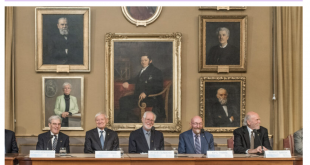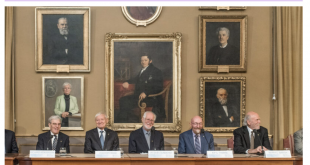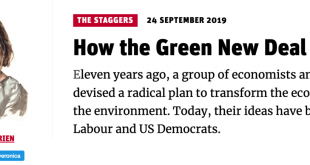Origins of National Income From the ultra pro-business World Economic Forum to the progressive “thinktank” New Economics Foundation, we find a growing consensus that the standard measure of economic performance, Gross Domestic Product (GDP), needs replacement. Its failure to adequately measure welfare or well being appears as a common threat in the critique of GDP (treated in detail in the 2009 study from Boston University), a theme repeated in the media. More broadly, some...
Read More »The Great Brexit Wrench
The Progressive Economy Forum today launched its new report, “The Great Brexit Wrench”, on the economic and political implications of Brexit. The report is by PRIME’s co-director Jeremy Smith, and looks at the background to and implications of Brexit from many different angles. It argues that there is no form of Brexit which will have a positive...
Read More »The Pope, Quincy Jones, Bono, Willie Colón – and the burden of sovereign debt.
On the eve of the 2019 annual meetings of the World Bank and IMF, we are once again alerted to a rise in the debt burdens of low-income countries. Last year the total external debt of both low- and middle-income countries climbed 5.3 percent to $7.8 trillion, while net debt flows (gross disbursements minus principal payments) from external creditors tumbled 28 percent to $529 billion, according to the World Bank’s International Debt Statistics. In other words debt burdens...
Read More »The non-existence of society and the ideology of neoclassical economics
In the United Kingdom we face the imminent likelihood of an election in which the political choices before voters will be in clear focus, remaining within the European Union or leaving (perhaps under disastrous conditions); social democracy or deregulated capitalism; saving the environment or further destruction of it; parliamentary democracy or authoritarianism. In the context of these momentous decisions, and with Parliament prorogued again, we should reflect on a still...
Read More »The End of Super Imperialism?
T Sabri Öncü ([email protected]) is an economist based in İstanbul, Turkey. This article was first published in the Indian journal the Economic and Political Weekly (EPW) on 28 September 2019.Summary: With intensifying concerns regarding the soundness and stability of the international monetary and financial system, calls for reforming it have been on the rise. One recent call was made by the Bank of England Governor Mark Carney, in August 2019, in which he suggested a...
Read More »How the sexist ‘Nobel Prize’ in economics has warped the world
The following hastily written piece appeared in Left Foot Forward on 25th September, 2019.The Nobel Memorial Prize in Economics will be 50 years old next month. One thing unites all its winners, bar one: they have all been male.This is not just an affront to equality. In overlooking brilliant female economists, the Swedish Central Bank’s Nobel has neglected economic theory which could have helped prevent the turmoil of regular financial shocks and political trauma.The...
Read More »Blog — Prime Economics
The Nobel Memorial Prize in Economics will be 50 years old next month. One thing unites all its winners, bar one: they have all been male.This is not just an affront to equality. In overlooking brilliant female economists, the Swedish Central Bank’s Nobel has neglected economic theory which could have helped prevent the turmoil of regular financial shocks and political trauma.The outstanding female economists passed over by the...
Read More »Balance of Power: The Economic Consequences of the Peace at 100
My review of John Maynard Keynes’s The Economic Consequences of the Peace Macmillan (2019) appeared in Nature – the International Journal of Science – on 23 September, 2019.“Ann Pettifor finds astonishing contemporary resonance in John Maynard Keynes’s critique of globalization and inequity.”The Economic Consequences of the Peace John Maynard Keynes Macmillan (2019)In December 1919, John Maynard Keynes published a blistering attack on the Treaty of Versailles, signed in...
Read More »UK Supreme Court – Johnson has ignored his “constitutional responsibility” as Prime Minister
So the UK Supreme Court (a bench of 11 judges) has delivered its judgment. Unaninmously. The prorogation of Parliament, based on the unlawful advice of Prime Minister Johnson, even if in form an act of the Queen, was null and void and of no effect.A couple of weeks ago, I concluded my post on The Rogue Prorogation and the English-Scottish judicial divide with these words:Whether the (UK) Supreme Court will be willing to go quite as far in making inferences of fact so...
Read More »How the Green New Deal was born – New Statesman
The following article and interview with PRIME’s director written by Hettie O’Brien, appeared in the New Statesman on 24th September, 2019. Please note the error at the end of the piece: Since the Paris Climate Agreement three years ago, J.P. Morgan Chase have reportedly lent $196 billion, not $1.96 billion to fossil fuel industries, oil, coal and gas. The figure is drawn from the Rainforest Action Network’s 2018 Report, Banking on Climate Change.Eleven years ago, a group...
Read More » Prime, Policy Research in Macroeconomics
Prime, Policy Research in Macroeconomics






